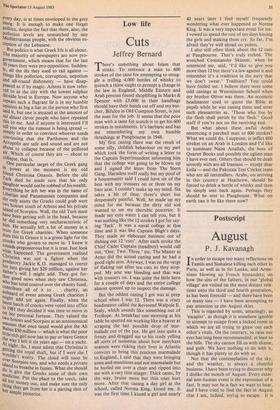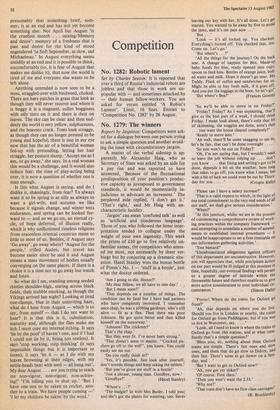Postscript
August
P. J. Kavanagh
In order to escape too many reflections on Tamils and Sinhalese killing each other in Paris, as well as in Sri Lanka, and Arme- nians blowing up French bystanders; on how the sins of the fathers, in our 'global village' are visited on the most distant rela- tions unto the third and fourth generation, as has been foretold — and there have been so many sins — I have been attempting to pay attention to the August skies.
This is regarded by some, amazingly, as 'escapist', as though it is somehow ignoble to attempt to escape from a locked room in which we are all trying to gnaw out each other's vitals. On the contrary, to raise our eyes has long been recommended, at least to the hills. The sky cannot fill us with shame, and guilt. We have nothing to do with it, though it has plenty to do with us.
Not that the contemplation of the sky, and the weather, is always a cheerful business. I have been trying to discover why I dislike the month of August. Every exter- nal non-human event is the expression of a fact. It may not be a fact we want to hear, and I have tried to find the fact in August that 1 am, indeed, tryilg to escape. It is presumably that something brief, sum- mer, is at an end and has not yet become something else. Not April but August 'is the cruellest month . . . mixing/Memory and desire': memory of a freshness that is past and desire for the kind of mood engendered 'in Soft September, at slow, sad Michaelmas.' In August everything seems untidily at an end and it is possible to think, uncomfortably (so, it is fear of August that makes me dislike it), that now the world is tired of me and everyone else wants to be left alone.
Anything untended is now seen to be a mess, straggled-over with bindweed, choked. There are bare patches in grass that look as though they will never recover and where it is boggy it is a stagnant, sullen bogginess with oily tints on it and there is dust on leaves. The sky can be clear and then sud- denly the world is eery yellow, sulphureous, and the heavens crack. Trees look scraggy, as though they can no longer pretend to be young and hopeful; there is one in my eye now that has the air of a beautiful woman fed-up with pretending, letting her hair straggle, her posture slump. 'Accept me as I am, or go away,' she says. In a real woman this would be a challenge, and it would also induce fear: the time of play-acting being over, it is now a question of whether one is man enough.
Is this what August is saying, and do I dislike it, shamingly, from fear? To always want it to be spring is as silly as always to want a girl-wife; and autumn we like because it signals change, and winter tests endurance, and spring can be looked for- ward to — and so we go on, an eternal cy- cle, of hope deferred, of illusion really, which is why unillusioned timeless religions from seasonless oriental countries mean so little to most of us. Besides, if August says `Go away', go away where? 'August for the people,' trilled Auden, but travel has become easier since he said it and August means a mass movement of bodies usually converging on the same places. If there is a choice it is a time not to go away but watch and listen.
So what do I see, standing among seeded thistles shoulder-high, staring across black fields, their stubble smoking, as though the Vikings arrived last night? Looking at fired tree-clumps, blue in their uninviting haze, what do I hear from August — which is to say, from myself — that I do not want to hear? It is that this is it, culmination, maturity and, although the flies make me itch I must cure my internal itching. It says 'lie by the pool' (I haven't one, and if 1 had I could not lie by it, being too restless). It says 'stop working, stop thinking' (it says impossible things but it is important to listen), it says 'let it — as I do with my leaves browning at their edges, with my nettle-heads bent with seed — all hang out'. My dear August . . . are you trying to teach me non-vigour, non-rigour, non-achiev- ing!' I'm telling you to shut up.' But I have one son to be taken to cricket, ano- ther to a train. We have people coming —' 'I let my children be taken', by the wind.'







































 Previous page
Previous page